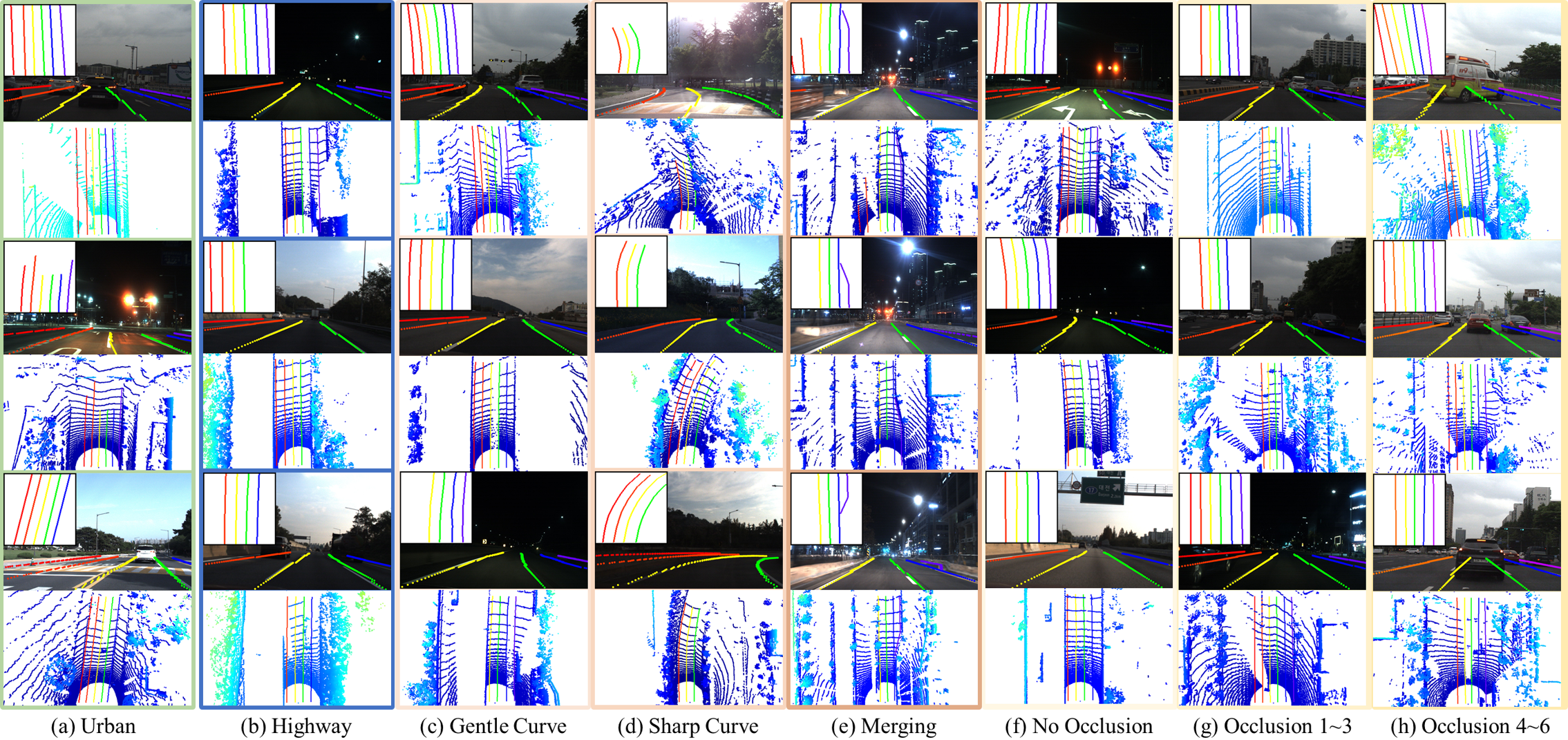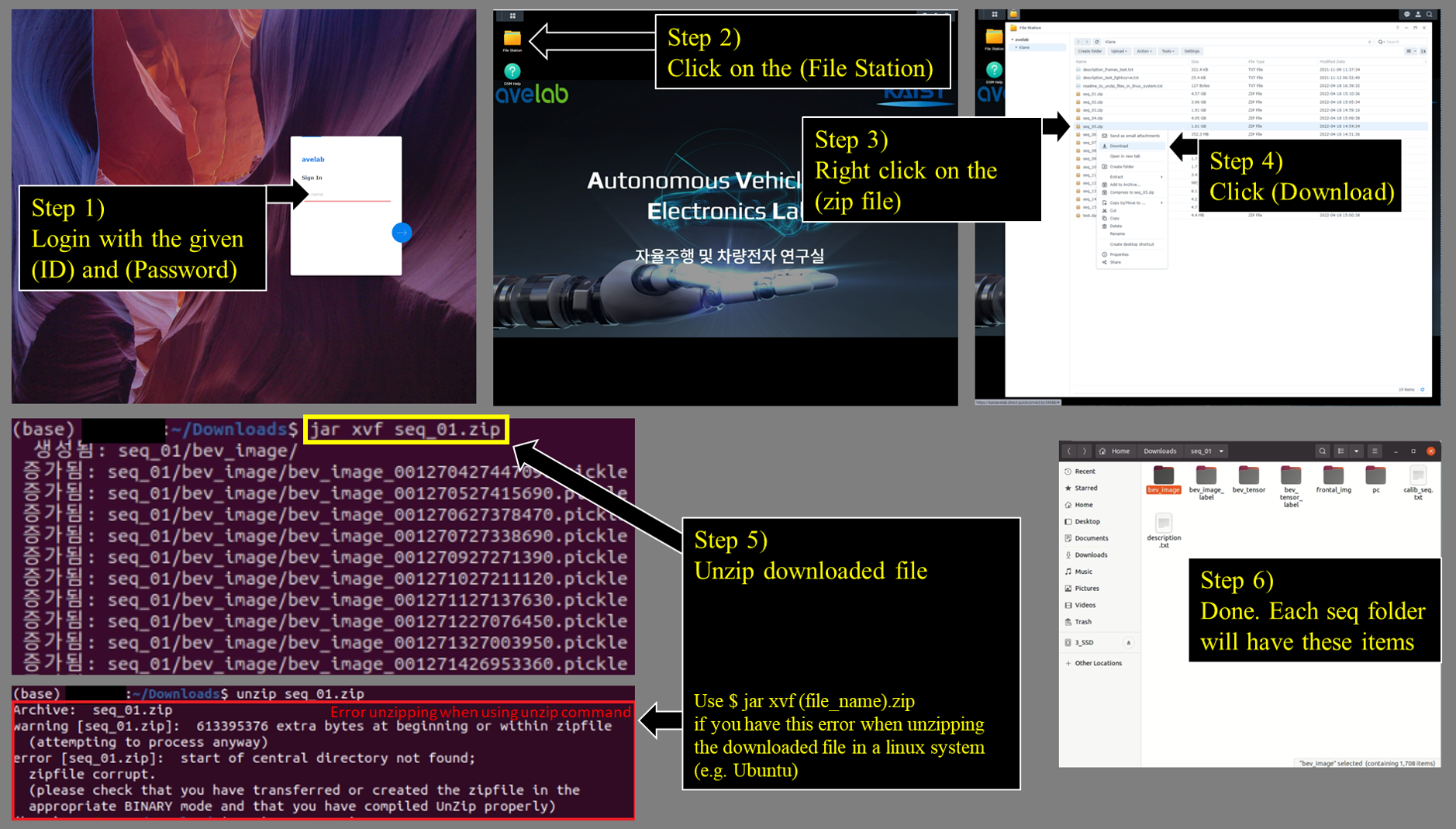K-Lane (KAIST-Lane) (provided by AVELab) is the world's first open LiDAR lane detection frameworks that provides a dataset with wide range of driving scenarios in an urban environment. This repository provides the K-Lane frameworks, annotation tool for lane labelling, and the visualization tool for showing the inference results and calibrating the sensors.
This is the documentation for how to use our detection frameworks with K-Lane dataset. We tested the K-Lane detection frameworks on the following environment:
- Python 3.7 / 3.8
- Ubuntu 18.04
- Torch 1.7.1
- CUDA 11.2
You can get a dataset in two different ways. One is about how to use our server, and the other is about how to use Google Drive.
- Via our server
- To download the dataset, log in to our server with the following credentials: ID : klaneds Password : Klane2022
- Go to the "File Station" folder, and download the dataset by right-click --> download. Note for Ubuntu user, there might be some error when unzipping the files. Please check the "readme_to_unzip_file_in_linux_system.txt".
- After all files are downloaded, please arrange the workspace directory with the following structure:
KLaneFrameworks
├── annot_tool
├── baseline
├── configs
├── config_vis.py
├── Proj28_GFC-T3_RowRef_82_73.py
├── Proj28_GFC-T3_RowRef_82_73.pth
├── data
├── KLane
├── test
├── train
├── seq_1
:
├── seq_15
├── description_frames_test.txt
├── description_test_lightcurve.txt
├── logs
- Via Google Drive Urls
Also, you can get the dataset through the following Google Drive urls.
- link for download seq_01 to 04
- link for download seq_05 to 12
- link for download seq_13 to 14
- link for download seq_15, test, and description
- Clone the repository
git clone ...
- Install the dependencies
pip install -r requirements.txt
- To train the model, prepare the total dataset and run
python train_gpu_0.py ...
- To test from a pretrained model (e.g., Proj28_GFC-T3_RowRef_82_73.pth), download the pretrained model from our Google Drive Model and run
python validate_gpu_0.py ...
- Testing can be done either with the python script or the GUI visualization tool. To test with the GUI visualization tool, please refer to the Visualization Tool visualization tool page
- Youtube Movie for 'How to use the annotation tool': https://www.youtube.com/watch?v=RXa0_gWNvZU
| Name | Overall | Daylight | Night | Urban | Highway | Curve | Merging | Occ-0 | Occ-2 | Occ-4~6 | GFLOPs | Model | Paper |
|---|---|---|---|---|---|---|---|---|---|---|---|---|---|
| LLDN-GFC | 82.12 | 82.22 | 82.00 | 81.75 | 82.55 | 78.05 | 81.08 | 82.97 | 81.28 | 75.92 | 558.0 | Link | Link |
| RLLDN-LC | 82.74 | 82.58 | 82.92 | 81.64 | 84.05 | 76.16 | 79.92 | 83.44 | 82.00 | 79.16 | 387.5 | Link | Link |
- [2022-04-18] v1.0.0 is released along with the K-Lane Dataset. Please check Getting Started for the download instruction.
K-Lane is released under the Apache-2.0 license.
The K-Lane benchmark is contributed by Dong-Hee Paek, Kevin Tirta Wijaya, Dong-In Kim, Min-Hyeok Sun, advised by Seung-Hyun Kong.
We thank the maintainers of the following projects that enable us to develop K-Lane:
OpenPCDet by MMLAB, TuRoad bu TuZheng.
This work was supported by the National Research Foundation of Korea (NRF) grant funded by the Korea government (MSIT) (No. 2021R1A2C3008370).
If you find this work is useful for your research, please consider citing:
@InProceedings{paek2022klane,
title = {K-Lane: Lidar Lane Dataset and Benchmark for Urban Roads and Highways},
author = {Paek, Dong-Hee and Kong, Seung-Hyun and Wijaya, Kevin Tirta},
booktitle = {Proceedings of the IEEE/CVF Conference on Computer Vision and Pattern Recognition (CVPR) Workshop on Autonomous Driving (WAD)},
month = {June},
year = {2022}
}


